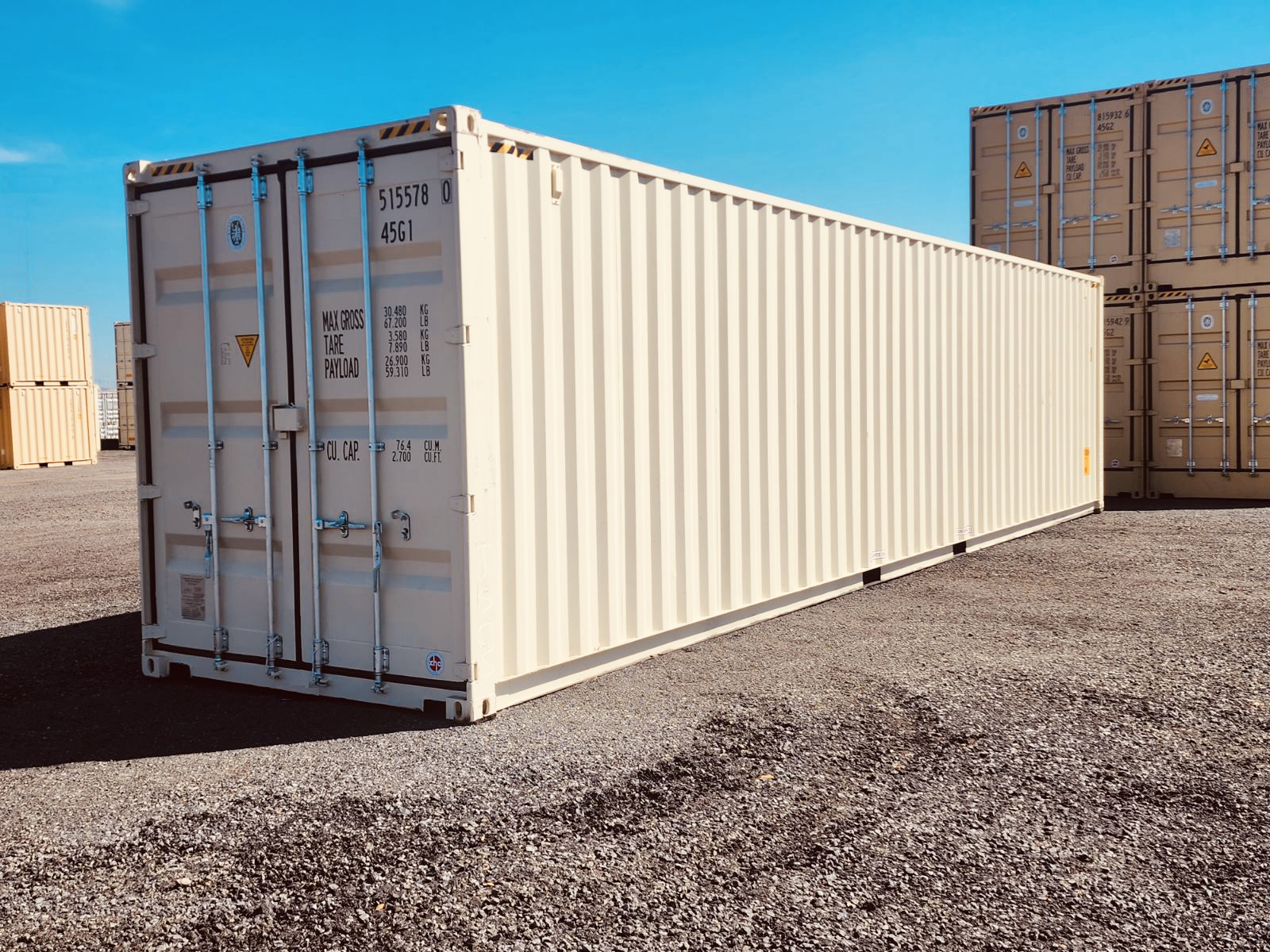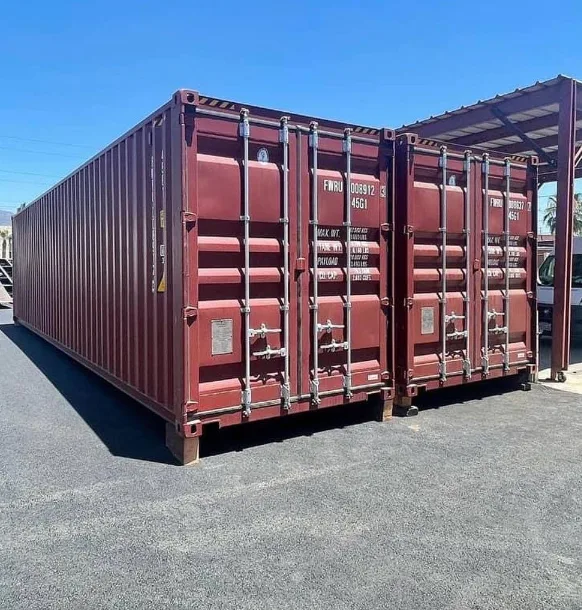How to Buy New Shipping Container 40 x 8 x 9.6 and Convert It into an Eco-Friendly Office
The Ultimate Overview to Selecting the Right Delivery Container for Your Needs
When it involves selecting the appropriate delivery container, understanding your specific needs is vital. You'll desire to think about variables like size, kind, and product to ensure you make the finest selection. From standard sizes to specialized options, there's a great deal to explore. And also, budgeting for both the container and any type of adjustments can make a huge difference. Let's damage down the key elements to help you find the ideal fit for your needs.
Understanding Shipping Container Sizes
When you're selecting a delivery container, comprehending the different sizes available is essential for making the appropriate choice. Delivering containers typically are available in conventional sizes of 20 and 40 feet, however you'll additionally find other measurements. Knowing the dimension you require depends upon what you prepare to shop or transport.If you're moving smaller items, a 20-foot container could be suitable, while larger shipments frequently need a 40-foot container. The height can additionally differ; high dice containers offer additional upright room, which can be beneficial for taller goods.Before choosing, determine your cargo, and take into consideration how much area you'll require for filling and unloading. Always consider prospective future demands-- choosing a slightly bigger container might conserve you inconvenience down the line. Ultimately, picking the ideal dimension will boost effectiveness and guarantee your products are safe throughout transportation
Kinds Of Shipping Containers Available
There are a number of kinds of shipping containers readily available, each developed for certain purposes and cargo demands. The basic completely dry container is flexible, best for basic freight. If you're delivering disposable goods, think about a cooled container, which keeps a regulated temperature level. For large things, high cube containers supply extra elevation, suiting taller loads.If you need to move heavy machinery or equipment, flat shelf containers give a sturdy base without wall surfaces. On the other hand, open-top containers enable simple loading of high cargo, with a detachable tarp covering for defense. If you're looking for adaptability, think about a retractable container that can be conveniently kept when not in use.Lastly, specialized containers like tank containers are made use of for fluids, while vented containers are developed for bulk cargo that needs ventilation. Knowing your freight kind will certainly help you pick the ideal container to meet your shipping requires effectively.
Material Considerations for Sturdiness
When picking a delivery container, the product plays an essential function in its resilience. You'll intend to weigh the benefits of steel versus aluminum, especially pertaining to corrosion resistance. Comprehending these variables can aid you make a more informed choice for your shipping needs.
Steel vs. Light weight aluminum Containers
How do you pick between steel and aluminum containers for your shipping needs? Begin by considering sturdiness. Steel containers are durable and offer exceptional stamina, making them optimal for hefty lots and severe conditions. They withstand damage from influences and are usually more economical, which can be a significant aspect for budget-conscious buyers.On the various other hand, aluminum containers are light-weight, which can conserve you on delivery expenses. They're less complicated to navigate and are a wonderful choice if you require to transport goods often. However, light weight aluminum is typically more pricey and much less robust than steel. Consider your details needs carefully, consisting of weight, price, and the sort of cargo you'll be delivery, to make the right option for your situation.
Corrosion Resistance Factors
Choosing the right product does not just include weight and cost; rust resistance plays a substantial function in longevity. When choosing a shipping container, consider the atmosphere it'll face. Steel containers, while solid, can rust otherwise correctly dealt with. Look for options with safety finishings or galvanization to boost their life-span. Aluminum, on the various other hand, provides all-natural rust resistance, making it ideal for coastal locations or damp problems. It can be much more pricey. Furthermore, examine the container's use-- if it'll be subjected to chemicals or rough climate, prioritize products that can withstand these conditions. Buying a corrosion-resistant container now can save you from expensive repairs or substitutes down the line. Select intelligently for long-lasting advantages.
Modifications and Modification Options
Delivering containers aren't just for carrying goods; they can be transformed to satisfy your specific requirements with various modifications and customization alternatives. You can transform a typical container right into a relaxing workplace area, a temporary retail store, or also an individual health club. The possibilities are almost endless.Think concerning including home windows, insulation, or air flow to enhance comfort. You could also take into consideration electrical wiring, pipes, or perhaps custom shelving to boost performance. If protection's a problem, reinforced locks can provide tranquility of mind.For visual appeal, you can repaint the container or add a special style to make it stand out. Don't ignore floor covering options-- whether you desire long lasting plywood or something much more innovative, it can raise the space.Ultimately, tailoring your shipping container to suit your needs can enhance usability and create an unique atmosphere that shows your style.
Examining Your Transportation Requirements
When it pertains to utilizing your customized shipping container, comprehending your transport needs is vital. Beginning by establishing what you'll be shipping-- whether it's heavy tools, retail goods, or personal things. Each kind of freight has different needs pertaining to dimension, weight, check my source and accessibility.Next, think about the distance and setting of transport. Are you shipping in your area, across the country, or globally? This impacts the container's design and performance. If you're utilizing trucks, ensure your container fits standard dimensions for very easy loading and unloading.Additionally, think about transportation conditions. Will your products need unique security from weather condition or temperature level variations? If so, you could require insulation or air flow features in your container.Lastly, assess how commonly you'll be delivering items. Constant deliveries might require a more long lasting and versatile container to satisfy recurring demands. By dealing with these aspects, you'll be well-prepared to choose the ideal shipping container for your needs.
Budgeting for Your Shipping Container
Establishing an allocate your delivery container is necessary for guaranteeing a smooth acquiring process. Initially, determine how much you can manage to invest. Keep in mind that costs can vary significantly based upon dimension, problem, and kind. New containers usually set you back much more, however made use of ones can supply substantial savings.Next, think about any kind of added costs you could incur, such as transport charges, shipment costs, and modifications. If you intend to personalize the container, factor in those costs also. Research different distributors to compare rates and discover the very best bargain that satisfies your needs.Don' t fail to remember to include any authorizations or regulations that might relate to your purchase and use of the container. By plainly outlining your budget, you'll be much better prepared to make enlightened choices, guaranteeing you Clicking Here obtain the appropriate container without damaging the bank.
Maintenance and Look After Long life
To assure your shipping container lasts for several years, routine upkeep is key. Beginning by examining the outside for rust, damages, and damage. If you find any kind of problems, resolve them right away to stop additional degeneration. Clean the container occasionally, both in and out, to remove dust, particles, and wetness that can bring about corrosion.Ensure the doors seal appropriately and lubricate the joints to prevent corrosion and sticking. If you're utilizing the container for storage, consider including air flow to minimize humidity and mold and mildew development. For additional protection, use a rust-inhibiting paint or sealant annually.If your container's located in a rough setting, like coastal areas, you might need to boost maintenance regularity. Watch on the floor covering, also; any type of signs of wear ought to be repaired today. With these simple actions, you'll extend the life of your delivery container substantially.
Frequently Asked Inquiries
How Do I Discover a Trustworthy Delivery Container Distributor?
To find a trustworthy shipping container distributor, begin by investigating online evaluations, requesting referrals from good friends or industry get in touches with, and comparing costs. Constantly inspect their credentials and warranty they offer quality containers that fulfill your demands.

Can I Lease a Shipping Container As Opposed To Acquiring?
Yes, you can certainly rent out a delivery container rather of getting one. Lots of suppliers provide rental options, which can conserve you money and give flexibility if you only require it for a brief period.
What Permits Are Required for Container Placement?

Are Delivery Containers Weatherproof and Appropriate for Outdoor Storage Space?
Yes, shipping containers are usually weatherproof, designed to withstand harsh problems. Their durable building maintains your things protected and dry, making them ideal for outside storage space. Just guarantee proper ventilation to protect against moisture buildup inside.
Exactly how Do I Transfer a Delivery Container When Acquired?
